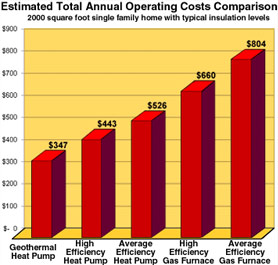While the green energy movement may be partially driven by sustainable energy needs, it is also highly influenced by economics: consumers and businesses are opting for geothermal energy alternatives as a means to save money over standard energy costs.
The primary question for businesses and consumers today is whether installing geothermal heat pumps provides an economic benefit over traditional energy sources given the fixed costs of geothermal energy installation.
While installation costs are also variable, geothermal energy is driven by a lower marginal cost relative to coal and natural gas, which encourages adoption along with tax incentives that help to buttress the fixed costs of setting up the system. Property owners should make insightful decisions when it comes to their energy costs: a properly integrated geothermal energy system can provide for efficiency and cost savings improvements over other forms of energy.
Many renewable sources of energy are actively competing for investment, including wind, solar, hydro power and geothermal energy. What separates geothermal energy from the other sources is that the technology is a proven, cost effective source of heating and cooling throughout the year, since sub-soil temperatures (which provide the source of energy transfer) are much more stable than naturally variable wind and sunlight.
There are active geothermal energy plans operating in areas such as California and Iceland, which utilize underground heat to power turbines – Northern California has a number of geothermal installations which provide energy on an impressive scale.
Recently, the Federal Government passed a renewable energy subsidy that provides billions in tax rebates for consumers, businesses and scientists to encourage adoption. These subsidies provide an important source of incentives for consumers to adopt the technology since estimates suggest marginal costs are up to 30% lower than traditional coal (efficient geothermal systems generate power at under 4 cents per KW-hour while Coal systems are roughly 6 KW-hour, not to mention the differentials in pollution emissions.)
In fact, Credit Suisse conducted a study (ref: http://emagazine.credit-suisse.com/article/index.cfm?fuseaction=OpenArticle&aoid=120785) which determined that geothermal energy is even more efficient than wind, nuclear, natural gas and clean goal in terms of efficient energy transfer. As a result, the primary impediment to adoption of the technology is the high fixed costs of installation given existing sources of natural gas and coal.
Installing a modern heat pump system can cost over $6,000 for a household, which is twice the cost of modernizing a traditional heating system. Depending on the conditions in one’s property, the installation costs can be expensive, although tax incentives have helped to lower these costs significantly. The Department of Energy as well as a number of states offer tax rebates to lower these costs, allowing households to supplement traditional sources of energy with Geothermal heat pumps.
Many households are able to generate energy from the systems at less than $0.04 kWh, which is often half the cost of traditional fossil fuel based heating systems. These economic advantages are driving widespread adoption of the technology when consumers, municipalities and firms are looking at the cost of geothermal energy for long term savings and better environmental practices.
To find out more information about the cost of geothermal energy, Contact us today.

